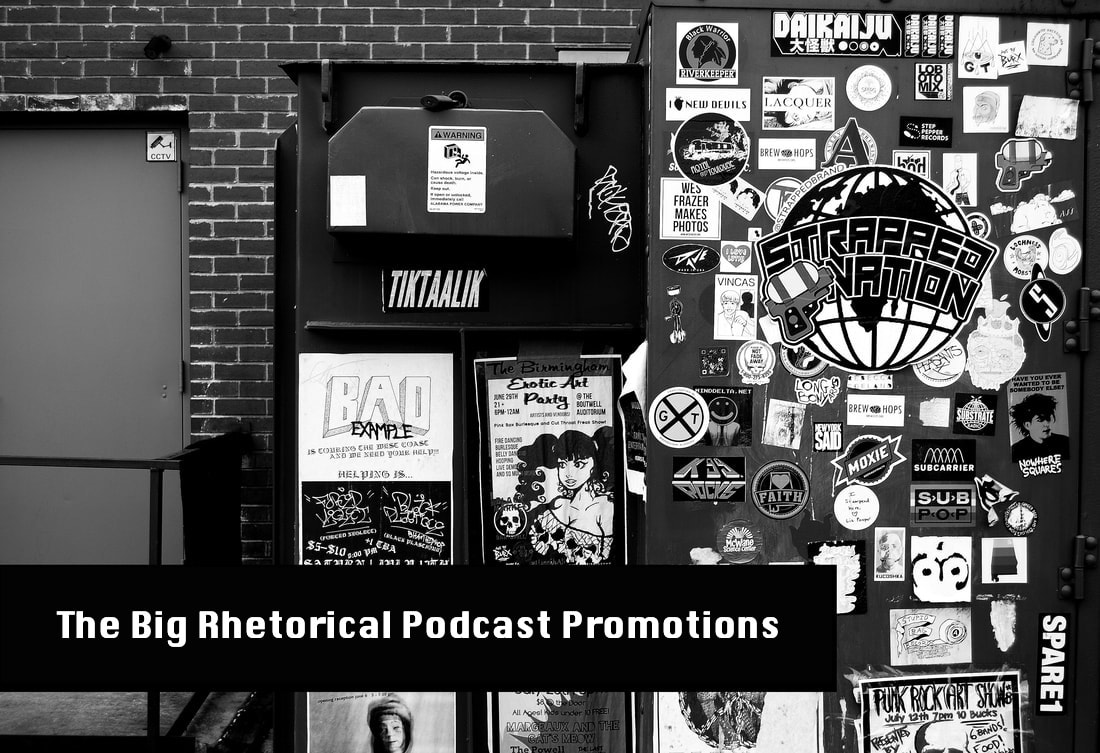Event and Publications Promotions
The Big Rhetorical Podcast is a digital space for conference organizers, institutional host delegates, conference board members, and the other event planners to promote their conference, event, or organization. We can talk about the CFP, the host city, and conference-goer expectations, as well as a range other topics relevant to your event.
The Big Rhetorical Podcast is also devoted to acknowledging the labor of scholars working in the field and in the discipline. Are you an author with a recent publication? Would you like to promote your book, monograph, special issue, journal article, etc.? Reach out to The Big Rhetorical Podcast! We want to collaborate with you!
Reach out to The Big Rhetorical Podcast by filling out a form at the bottom of the page to be featured on The Big Rhetorical Podcast. I want to acknowledge your labor and promote your event and/or publication!
The Big Rhetorical Podcast is also devoted to acknowledging the labor of scholars working in the field and in the discipline. Are you an author with a recent publication? Would you like to promote your book, monograph, special issue, journal article, etc.? Reach out to The Big Rhetorical Podcast! We want to collaborate with you!
Reach out to The Big Rhetorical Podcast by filling out a form at the bottom of the page to be featured on The Big Rhetorical Podcast. I want to acknowledge your labor and promote your event and/or publication!
Recent Episodes
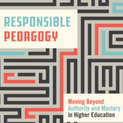
January 2023
Responsible Pedagogy makes a fresh case for the importance and value of public higher education and the work of teaching. In making this case, Eric Detweiler surveys the history of rhetoric and writing in postsecondary education, looking in particular at the teacher-student relationship. He finds that from the Socratic method to medieval exercises, from MOOCs to remote, asynchronous learning, the balance of authority and agency in the classroom is often precarious. But the problem goes deeper. Underlying both authority and agency is the value of mastery, which the teacher is to impart to the student. It is this emphasis on mastery, Detweiler argues, that distorts the proper relation between the student and teacher, a relationship in which they are responsible for and vulnerable to each other (PSU Press).
Responsible Pedagogy makes a fresh case for the importance and value of public higher education and the work of teaching. In making this case, Eric Detweiler surveys the history of rhetoric and writing in postsecondary education, looking in particular at the teacher-student relationship. He finds that from the Socratic method to medieval exercises, from MOOCs to remote, asynchronous learning, the balance of authority and agency in the classroom is often precarious. But the problem goes deeper. Underlying both authority and agency is the value of mastery, which the teacher is to impart to the student. It is this emphasis on mastery, Detweiler argues, that distorts the proper relation between the student and teacher, a relationship in which they are responsible for and vulnerable to each other (PSU Press).
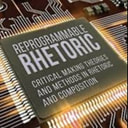
December 2022
“This collection offers nuanced theoretical perspectives on material and cultural rhetorics alongside practical tutorials for students, researchers, and teachers to explore critical making across traditional areas such as wearable sensors, Arduinos, Twitter bots, multimodal pedagogy, Raspberry Pis, and paper circuitry, as well as underexplored areas like play, gaming, text mining, bots, and electronic monuments” (upcolorado.com). Available now from Utah State University Press.
“This collection offers nuanced theoretical perspectives on material and cultural rhetorics alongside practical tutorials for students, researchers, and teachers to explore critical making across traditional areas such as wearable sensors, Arduinos, Twitter bots, multimodal pedagogy, Raspberry Pis, and paper circuitry, as well as underexplored areas like play, gaming, text mining, bots, and electronic monuments” (upcolorado.com). Available now from Utah State University Press.
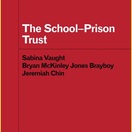
November 2022
“The School–Prison Trust describes interrelated histories, ongoing ideologies, and contemporary expressions of what the authors call the “school–prison trust”: a conquest strategy encompassing the boarding school and juvenile prison models and deployed in the long war against Native peoples. At its heart, the book is a constellation of stories of Indigenous self-determination in the face of this ongoing conquest.” (upress.umn.edu). Available now from University of Minnesota Press.
“The School–Prison Trust describes interrelated histories, ongoing ideologies, and contemporary expressions of what the authors call the “school–prison trust”: a conquest strategy encompassing the boarding school and juvenile prison models and deployed in the long war against Native peoples. At its heart, the book is a constellation of stories of Indigenous self-determination in the face of this ongoing conquest.” (upress.umn.edu). Available now from University of Minnesota Press.

November 2022
Rhetoric and Guns “advances more direct, systematic engagement in the field and beyond by analyzing rhetoric about guns, guns in rhetoric, and guns as rhetoric, particularly as they relate to specific instances of guns in culture. The authors attempt to understand rhetoric’s relationship to guns by analyzing rhetoric about guns and the ways they function both in and as rhetoric related to specific instances—in media coverage, political speech, marketing, and advertising. Original chapters from scholars in rhetorical studies, communication, education, and related fields elucidate how rhetoric is used to maintain and challenge the deadly status quo of gun violence in the United States and extend rhetoricians’ sustained interest in the fields’ relationships to violence, brutality, and atrocity” (upcolorado.com).
Rhetoric and Guns “advances more direct, systematic engagement in the field and beyond by analyzing rhetoric about guns, guns in rhetoric, and guns as rhetoric, particularly as they relate to specific instances of guns in culture. The authors attempt to understand rhetoric’s relationship to guns by analyzing rhetoric about guns and the ways they function both in and as rhetoric related to specific instances—in media coverage, political speech, marketing, and advertising. Original chapters from scholars in rhetorical studies, communication, education, and related fields elucidate how rhetoric is used to maintain and challenge the deadly status quo of gun violence in the United States and extend rhetoricians’ sustained interest in the fields’ relationships to violence, brutality, and atrocity” (upcolorado.com).
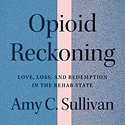
September 2022
Dr. Amy C. Sullivan is an independent scholar and history professor at Macalester College in St. Paul, Minnesota. She is the author of the book, Opioid Reckoning: Love, Loss, and Redemption in the Rehab State. Her teaching and research focus on personal narratives, community healing, and social change via oral history, public history, and digital archive projects. She lives in Minneapolis with her family.
Dr. Amy C. Sullivan is an independent scholar and history professor at Macalester College in St. Paul, Minnesota. She is the author of the book, Opioid Reckoning: Love, Loss, and Redemption in the Rehab State. Her teaching and research focus on personal narratives, community healing, and social change via oral history, public history, and digital archive projects. She lives in Minneapolis with her family.
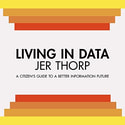
April 2022
"To live in data in the twenty-first century is to be incessantly extracted from, classified and categorized, statisti-fied, sold, and surveilled. Data—our data—is mined and processed for profit, power, and political gain. In Living in Data, Thorp asks a crucial question of our time: How do we stop passively inhabiting data, and instead become active citizens of it? Threading a data story through hippo attacks, glaciers, and school gymnasiums, around colossal rice piles, and over active minefields, Living in Datareminds us that the future of data is still wide open, that there are ways to transcend facts and figures and to find more visceral ways to engage with data, that there are always new stories to be told about how data can be used. Punctuated with Thorp's original and informative illustrations, Living in Data not only redefines what data is, but reimagines who gets to speak its language and how to use its power to create a more just and democratic future. Timely and inspiring, Living in Data gives us a much-needed path forward." - McMillan Publishing
"To live in data in the twenty-first century is to be incessantly extracted from, classified and categorized, statisti-fied, sold, and surveilled. Data—our data—is mined and processed for profit, power, and political gain. In Living in Data, Thorp asks a crucial question of our time: How do we stop passively inhabiting data, and instead become active citizens of it? Threading a data story through hippo attacks, glaciers, and school gymnasiums, around colossal rice piles, and over active minefields, Living in Datareminds us that the future of data is still wide open, that there are ways to transcend facts and figures and to find more visceral ways to engage with data, that there are always new stories to be told about how data can be used. Punctuated with Thorp's original and informative illustrations, Living in Data not only redefines what data is, but reimagines who gets to speak its language and how to use its power to create a more just and democratic future. Timely and inspiring, Living in Data gives us a much-needed path forward." - McMillan Publishing
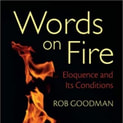
April 2022
"Why is political rhetoric broken - and how can it be fixed? Words on Fire returns to the origins of rhetoric to recover the central place of eloquence in political thought. Eloquence, for the orators of classical antiquity, emerged from rhetorical relationships that exposed both speaker and audience to risk. Through close readings of Cicero - and his predecessors, rivals, and successors - political theorist and former speechwriter Rob Goodman tracks the development of this ideal, in which speech is both spontaneous and stylized, and in which the pursuit of eloquence mitigates political inequalities. He goes on to trace the fierce disputes over Ciceronian speech in the modern world through the work of such figures as Burke, Macaulay, Tocqueville, and Schmitt, explaining how rhetorical risk-sharing has broken down. Words on Fire offers a powerful critique of today's political language - and shows how the struggle over the meaning of eloquence has shaped our world." - Promotional Material
"Why is political rhetoric broken - and how can it be fixed? Words on Fire returns to the origins of rhetoric to recover the central place of eloquence in political thought. Eloquence, for the orators of classical antiquity, emerged from rhetorical relationships that exposed both speaker and audience to risk. Through close readings of Cicero - and his predecessors, rivals, and successors - political theorist and former speechwriter Rob Goodman tracks the development of this ideal, in which speech is both spontaneous and stylized, and in which the pursuit of eloquence mitigates political inequalities. He goes on to trace the fierce disputes over Ciceronian speech in the modern world through the work of such figures as Burke, Macaulay, Tocqueville, and Schmitt, explaining how rhetorical risk-sharing has broken down. Words on Fire offers a powerful critique of today's political language - and shows how the struggle over the meaning of eloquence has shaped our world." - Promotional Material
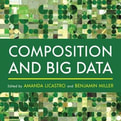
February 2022
"In a data-driven world, anything can be data. As the techniques and scale of data analysis advance, the need for a response from rhetoric and composition grows ever more pronounced. It is increasingly possible to examine thousands of documents and peer-review comments, labor-hours, and citation networks in composition courses and beyond. Composition and Big Data brings together a range of scholars, teachers, and administrators already working with big-data methods and datasets to kickstart a collective reckoning with the role that algorithmic and computational approaches can, or should, play in research and teaching in the field. Their work takes place in various contexts, including programmatic assessment, first-year pedagogy, stylistics, and learning transfer across the curriculum. From ethical reflections to database design, from corpus linguistics to quantitative autoethnography, these chapters implement and interpret the drive toward data in diverse ways." - University of Pittsburgh Press
"In a data-driven world, anything can be data. As the techniques and scale of data analysis advance, the need for a response from rhetoric and composition grows ever more pronounced. It is increasingly possible to examine thousands of documents and peer-review comments, labor-hours, and citation networks in composition courses and beyond. Composition and Big Data brings together a range of scholars, teachers, and administrators already working with big-data methods and datasets to kickstart a collective reckoning with the role that algorithmic and computational approaches can, or should, play in research and teaching in the field. Their work takes place in various contexts, including programmatic assessment, first-year pedagogy, stylistics, and learning transfer across the curriculum. From ethical reflections to database design, from corpus linguistics to quantitative autoethnography, these chapters implement and interpret the drive toward data in diverse ways." - University of Pittsburgh Press
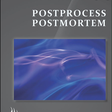
September 2021
In Postprocess Postmortem, Kristopher M. Lotier surveys the postprocess era-that-never-was, its end, and its after-lives. Employing cutting-edge digital research tools to track the circulation of texts and shifting scales from the global to the local and back again, he offers a revisionist history of a largely unchronicled past. From one perspective, the history of postprocess might seem to be a history of failure: what could have become The Next Big Thing in composition and writing studies during the 1990s and early 2000s never quite ascended. Today, few writing studies scholars apply the term postprocess to their own research or self-identify with a postprocess movement. And yet, as Lotier demonstrates, numerous core postprocess tenets have attained disciplinary centrality. The result: whether they admit to doing so or not, many contemporary scholars employ a postprocess vocabulary, allowing the ideas underlying this important movement/theory/period/attitude to live on.
In Postprocess Postmortem, Kristopher M. Lotier surveys the postprocess era-that-never-was, its end, and its after-lives. Employing cutting-edge digital research tools to track the circulation of texts and shifting scales from the global to the local and back again, he offers a revisionist history of a largely unchronicled past. From one perspective, the history of postprocess might seem to be a history of failure: what could have become The Next Big Thing in composition and writing studies during the 1990s and early 2000s never quite ascended. Today, few writing studies scholars apply the term postprocess to their own research or self-identify with a postprocess movement. And yet, as Lotier demonstrates, numerous core postprocess tenets have attained disciplinary centrality. The result: whether they admit to doing so or not, many contemporary scholars employ a postprocess vocabulary, allowing the ideas underlying this important movement/theory/period/attitude to live on.
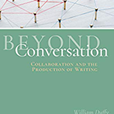
April 2021
Dr. William Duffy is Associate Professor of English and Coordinator of the Writing, Rhetoric, and Technical Communication Program at the University of Memphis. His scholarship has been published in Rhetoric Review, Composition Studies, College English, and Present Tense, as well as in various edited collections. His new book Beyond Conversation: Collaboration and the Production of Writing is available now.
Dr. William Duffy is Associate Professor of English and Coordinator of the Writing, Rhetoric, and Technical Communication Program at the University of Memphis. His scholarship has been published in Rhetoric Review, Composition Studies, College English, and Present Tense, as well as in various edited collections. His new book Beyond Conversation: Collaboration and the Production of Writing is available now.

March 2021
John Archibald is the author of “Shaking the Gates of Hell: A Search for Family and Truth in the Wake of the Civil Rights Revolution” which was published by Alfred A. Knopf in 2021. In 2018, John won the Pulitzer Prize for his commentary on politics in the state of Alabama and in 2020 was awarded a Nieman Foundation Fellowship to study the the future of digital media at Harvard University.
John Archibald is the author of “Shaking the Gates of Hell: A Search for Family and Truth in the Wake of the Civil Rights Revolution” which was published by Alfred A. Knopf in 2021. In 2018, John won the Pulitzer Prize for his commentary on politics in the state of Alabama and in 2020 was awarded a Nieman Foundation Fellowship to study the the future of digital media at Harvard University.
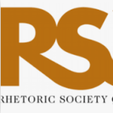
March 2021
Kyle Larson is a Ph.D. Candidate at Miami University in Oxford, Ohio. Dr. Guy McHendry is an Associate Professor at Creighton University. Their article, “Parasitic Publics,” in RSQ is the recipient of the 2020 Outstanding Article Award from the Critical Cultural Studies Division of the National Communication Association.
Kyle Larson is a Ph.D. Candidate at Miami University in Oxford, Ohio. Dr. Guy McHendry is an Associate Professor at Creighton University. Their article, “Parasitic Publics,” in RSQ is the recipient of the 2020 Outstanding Article Award from the Critical Cultural Studies Division of the National Communication Association.
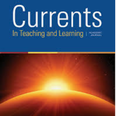
March 2021
Jessica Kester is a Professor of English in the School of Humanities and Communication and the Quanta-Honors College at Daytona State College. Dr. Stephanie Vie is Associate Dean of the Outreach College and Professor of English at the University of Hawai‘i at Mānoa. Their article, "Social Media in Practice: Assignments, Perceptions, Possibilities" is in Currents in Teaching and Learning.
Jessica Kester is a Professor of English in the School of Humanities and Communication and the Quanta-Honors College at Daytona State College. Dr. Stephanie Vie is Associate Dean of the Outreach College and Professor of English at the University of Hawai‘i at Mānoa. Their article, "Social Media in Practice: Assignments, Perceptions, Possibilities" is in Currents in Teaching and Learning.
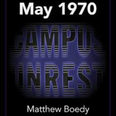
February 2021
Dr. Matthew Boedy is an assistant professor of rhetoric and composition at the University of North Georgia. His new book, May 1970, is published with Intermezzo.
Dr. Matthew Boedy is an assistant professor of rhetoric and composition at the University of North Georgia. His new book, May 1970, is published with Intermezzo.
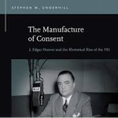
November 2020
The Manufacture of Consent: J. Edgar Hoover and the Rhetorical Rise of the FBI by Stephen M. Underhill, an Associate Professor in the Department of Communication Studies at Marshall University.
The Manufacture of Consent: J. Edgar Hoover and the Rhetorical Rise of the FBI by Stephen M. Underhill, an Associate Professor in the Department of Communication Studies at Marshall University.

October 2020
NYU ReVision & ReForm: Writing Across the Borders symposium. Charles is joined by poet and writer Nicole Callihan, a Senior Language Lecturer in New York University’s Expository Writing Program, where she serves as Assistant Director of EWP at Tandon’s School of Engineering.
NYU ReVision & ReForm: Writing Across the Borders symposium. Charles is joined by poet and writer Nicole Callihan, a Senior Language Lecturer in New York University’s Expository Writing Program, where she serves as Assistant Director of EWP at Tandon’s School of Engineering.
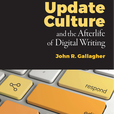
April 2020
Interview with Dr. John R. Gallagher, University of Illinois, and author of Update Culture and the Afterlife of Digital Writing.
Interview with Dr. John R. Gallagher, University of Illinois, and author of Update Culture and the Afterlife of Digital Writing.

February 2020
Sounds from Southeastern Writing Center Association Conference live recording from The Woolworth in Birmingham, Alabama.
Sounds from Southeastern Writing Center Association Conference live recording from The Woolworth in Birmingham, Alabama.
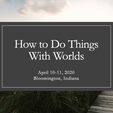
November 2019
Interview with Brianna Best and Phil Choong, Indiana University graduate students and How To Do Things With Worlds conference co-chairs.
Interview with Brianna Best and Phil Choong, Indiana University graduate students and How To Do Things With Worlds conference co-chairs.

September 2019
Sounds from 2019 3M Symposium: "Mindfulness, Media, and Misinformation in the Digital Era" live recording from Tin Man Brewing Company in Kokomo, Indiana.
Sounds from 2019 3M Symposium: "Mindfulness, Media, and Misinformation in the Digital Era" live recording from Tin Man Brewing Company in Kokomo, Indiana.

September 2019
Interview with Dr. Kirk St. Amant, Professor at Louisiana Tech University, who holds appointments in the Center for Biomedical Engineering and Rehabilitation Sciences, Health Informatics and Information Management, and the School of Literature and Language about two upcoming events: "The Louisiana Tech Symposium on Visual Communication & Visual Literacy" and "The University of Strasbourg Symposium on Technical Communication, Translation, and Usability and Design."
Interview with Dr. Kirk St. Amant, Professor at Louisiana Tech University, who holds appointments in the Center for Biomedical Engineering and Rehabilitation Sciences, Health Informatics and Information Management, and the School of Literature and Language about two upcoming events: "The Louisiana Tech Symposium on Visual Communication & Visual Literacy" and "The University of Strasbourg Symposium on Technical Communication, Translation, and Usability and Design."

September 2019
Interview with 2020 Southeastern Writing Centers Association Conference Chair Dr. Jaci Wells, Associate Professor and Writing Center Director at the University of Alabama at Birmingham.
Interview with 2020 Southeastern Writing Centers Association Conference Chair Dr. Jaci Wells, Associate Professor and Writing Center Director at the University of Alabama at Birmingham.
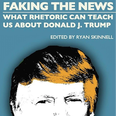
September 2019
Interview with Dr. Ryan Skinnell, Assistant Professor and Assistant Writing Program Administrator at San Jose State University, and author of Faking the News: What Rhetoric Can Teach Us About Donald J. Trump.
Interview with Dr. Ryan Skinnell, Assistant Professor and Assistant Writing Program Administrator at San Jose State University, and author of Faking the News: What Rhetoric Can Teach Us About Donald J. Trump.

August 2019
Interview with "Mindfulness, Media, and Misinformation in the Digital Era" Conference Co-Chair Dr. Paul Cook, Associate Professor of English and Director of Writing at Indiana University Kokomo.
Interview with "Mindfulness, Media, and Misinformation in the Digital Era" Conference Co-Chair Dr. Paul Cook, Associate Professor of English and Director of Writing at Indiana University Kokomo.

July 2019
Interview with "Language, Rhetoric, and Digital Publics: Making Space for All" LangRhet Conference Co-Organizer Kelly Wheeler, Ph.D. student at the University of Michigan.
Interview with "Language, Rhetoric, and Digital Publics: Making Space for All" LangRhet Conference Co-Organizer Kelly Wheeler, Ph.D. student at the University of Michigan.
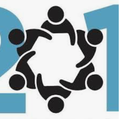
June 2019
Sounds from 2019 Computers & Writing Conference Bowling Night features interviews with various scholars and graduate students working in the discipline.
Sounds from 2019 Computers & Writing Conference Bowling Night features interviews with various scholars and graduate students working in the discipline.
